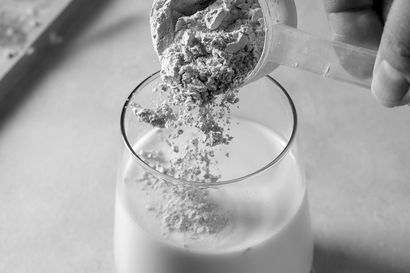Is apple cider vinegar actually any good for you?
You read and hear about apple cider vinegar all the time, but what does it actually do and should you be downing it with your morning coffee?
Ah apple cider vinegar! Everybody seems to be taking it, from Orlando Bloom and Katy Perry to Elizabeth Hurley and Victoria Beckham, the world's gone mad for the stuff. It's apparently got benefits for everything from your gut to your hair to your skin. But, whether you're taking it in supplement gummy form, sipping it like an Old Fashioned or downing it like a tequila shot, the question remains: is apple cider vinegar actually any good for you?
"Overall, Apple Cider Vinegar (ACV) is a great product to supplement a healthy lifestyle that includes regular exercise, a diet rich in fruits and vegetables, and quality protein sources," says Olu Adepitan, nutritionist, BXR trainer and founder of Champion Health & Fitness. "Apple cider vinegar may help control high blood pressure, glucose levels, and fat storage, making it potentially beneficial in managing type 2 diabetes. However, it is important to note that not all ACV products offer the same benefits. These claims are specifically associated with apple cider vinegar that contains the "mother of vinegar" component, as opposed to products lacking in it."
Which apple cider vinegar should you buy?
Apple cider vinegar (ACV) is a type of vinegar made by fermenting the sugars in apples. The fermentation process involves converting the sugars into alcohol through the action of yeast and bacteria. This alcohol is then further fermented into acetic acid, which gives vinegar its characteristic tangy taste and strong smell. "There are two main types of apple cider vinegar; filtered and unfiltered," explains Andy Daly, an in-house nutritionist at Dr David Jack. "Filtered apple cider vinegar is clear and free from any sediment, as it has been filtered and pasteurised. It is the most common form found in supermarkets. Unfiltered contains the "mother," which is believed to have additional health benefits due to the presence of probiotics and enzymes."
How do you take apple cider vinegar?
When ingesting, dilution is key: always dilute apple cider vinegar to reduce its acidity, which can cause tooth enamel erosion and throat irritation if taken undiluted. Alternatively, use a straw and rinse your mouth with water to help neutralise the acid after drinking it.
"Begin with a small amount of apple cider vinegar (like one teaspoon) to see how your body reacts, and gradually increase the dosage if necessary," says Daly. "Even though apple cider vinegar has benefits, it’s important not to consume too much. Excessive intake can lead to low potassium levels and other side effects."
What're the general health benefits of apple cider vinegar?
Apple cider vinegar can help improve insulin sensitivity and lower blood sugar levels after meals, while its acetic acid content has been linked to reduced fat storage and appetite suppression.
It has been proven to reduce cholesterol levels and blood pressure, while thanks to its anti-fungal properties it can act as a natural remedy for infections.
Can apple cider vinegar be beneficial for your skin?
"ACV can be beneficial for the skin due to its antibacterial, anti-fungal, and acidic properties," Daly continues. "Its natural antibacterial properties can help reduce the bacteria that contribute to acne. Its acidic nature helps to balance the skin's pH, which can prevent overproduction of oil and breakouts. The acetic acid in ACV can also act as a gentle exfoliant, helping to remove dead skin cells. When it comes to eczema and psoriasis, some people find that applying diluted ACV reduces symptoms by acting as an anti-inflammatory."
Apple cider vinegar can also be used as a topical treatment for your skin. "Dilute it with water (one part apple cider vinegar to three parts water) and epply it to your skin using a cotton pad after cleansing," Daly advises. "Do this once daily or every other day, depending on skin sensitivity."
Can apple cider vinegar be good for your hair?
Apple cider vinegar, when ingested, can have positive effects on your hair and scalp health. It can also help combat dandruff and scalp psoriasis, as it can be beneficial to the balance of oils on your head. "The scalp's pH is naturally acidic, and ACV can help restore balance, especially if a person uses alkaline hair products or treatments that disrupt this balance," Daly says. "ACV's anti-fungal properties may also help combat dandruff by reducing the presence of a type of yeast that can contribute to it."
You can also use apple cider vinegar as a wash for your hair. "For hair care (dandruff, shine, and scalp health) mix two to four tablespoons of apple cider vinegar with about two cups of water to create a hair rinse," Daly recommends. "After shampooing, pour the mixture over your hair and scalp, massaging it in gently. Leave it on for one to two minutes, then rinse thoroughly with water. Use twice a week. This should help to balance scalp pH, reduce dandruff, remove product buildup, and add shine to hair."
Who should consider taking apple cider vinegar?
Those who have low stomach acid (hypochlorhydria) may benefit from apple cider vinegar. "It can help improve digestion and reduce symptoms like bloating and indigestion by increasing stomach acidity," Daly says. "ACV might help some people with mild acid reflux (caused by low stomach acid) by balancing the stomach’s pH."
Apple cider vinegar can also help improve insulin sensitivity and lower blood sugar levels after meals, making it beneficial for those with insulin resistance or type 2 diabetes. It can also aid weight loss, as it can promote satiety and a reduction in an overall calorie intake.
Who should avoid taking apple cider vinegar?
"People with osteoporosis or low bone density should avoid using apple cider vinegar," Daly suggests. Excessive consumption may lead to reduced bone density because of its potential to lower potassium levels and affect calcium metabolism, which is crucial for bone health.
Meanwhile apple cider vinegar is highly acidic and can erode tooth enamel over time, so people with sensitive teeth or a history of dental problems should be cautious and may want to avoid it.
Importantly "apple cider vinegar can interact with diabetes medications, potentially causing blood sugar levels to drop too low," Daly says. "It can also interact with diuretics and some blood pressure medications, leading to potassium depletion and other imbalances. Those with peptic ulcers should avoid ACV as it can irritate the stomach lining and exacerbate symptoms."
Want more grooming content? Check out the best new products each week
Become a Gentleman’s Journal member. Find out more here.

Become a Gentleman’s Journal Member?
Like the Gentleman’s Journal? Why not join the Clubhouse, a special kind of private club where members receive offers and experiences from hand-picked, premium brands. You will also receive invites to exclusive events, the quarterly print magazine delivered directly to your door and your own membership card.


